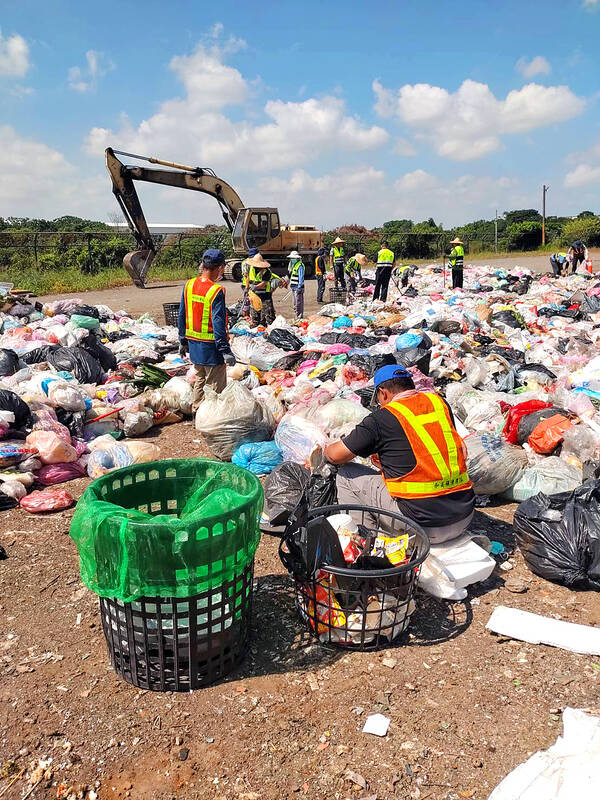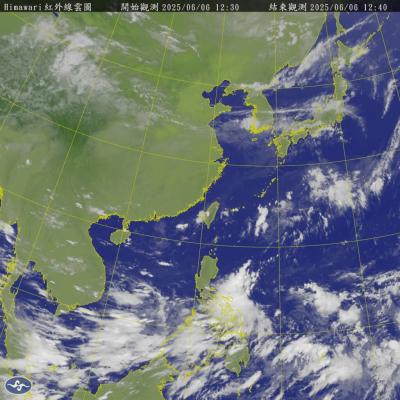The annual amount of waste in Taiwan has exceeded 10 million tonnes for three consecutive years and reached a new high at 11.58 million tonnes last year, despite 20 years of waste reduction efforts, the latest data from the Ministry of Environment showed.
The waste reduction policy has been implemented for 20 years, but Taiwan’s waste continues to increase every year.
The quantity of resource waste such as single-use plastic products and paper containers has surged since online shopping and food delivery became common.

Photo courtesy of Homei Township
Single-use plastic and paper container waste have risen as the COVID-19 pandemic has increased the use of food delivery and takeout, the ministry’s Resource Circulation Administration Director Lai Ying-ying (賴瑩瑩) said, adding that the popularity of online shopping has increased the amount of single-use plastic wrapper waste as well.
Taiwan has been promoting “zero waste” since 2003 with a focus on source reduction and recycling.
The total output of general waste, including general trash, recyclable garbage and food waste, was approximately 7.71 million tonnes in 2003 and remained between 7.2 million and 7.9 million tonnes by 2017, the ministry’s data showed.
However, the number rose significantly to 9.74 million tonnes in 2018 and continued to increase, surpassing 10 million tonnes in 2021, the data showed.
Last year, the amount of general waste hit a record high of 11.58 million tonnes, of which about 4.82 million tonnes were general trash, 6.27 million tonnes were recyclable garbage and 480,000 tonnes were food waste, indicating a daily average of 1.36kg of general waste per person, it showed.
The upsurge in general waste has been due to the inclusion of general trash generated by company employees in 2018, as well as those by non-routine activities such as temple fairs and large events in 2022, the ministry’s Environmental Management Administration said.
The data also showed that the quantity of recyclable garbage consistently increased from 4.83 million tonnes in 2018 to 6.27 million tonnes in 2023, while the quantity of general trash remained 4 million to 5 million tonnes for those six years — a sign that the source reduction effectiveness has decreased.
To reduce single-use containers, the ministry has been cooperating with food delivery platforms to jointly promote the use of reusable food containers in delivery, while also expanding their applicability, Lai said.
For example, reusable cups and food containers could be recommended to be used during large companies’ conferences or large-scale activities such as sports events, with the aim of forming a reusable container industrial chain, she said.
Aside from the enforced rules to reduce online shopping packaging, the ministry would also promote the reduction of plastic grocery bags in traditional markets and night markets to decrease single-use plastic packaging, Lai said.
Meanwhile, some household trash would be temporarily placed at landfills due to the successive closure of 24 incinerators for renovation and expansion, with the amount having reached 840,000 tonnes nationwide.
This quantity of temporary waste is estimated to be fully disposed of no sooner than 2036 based on the total incinerator capacity, Minister of Environment Peng Chi-ming (彭啟明) said last month.
However, the ministry’s most optimistic estimate of disposing of the temporary trash in 12 years might be too optimistic as the waste amount keeps increasing, Greenpeace Taiwan plastic reduction project director Chang Kai-ting (張凱婷) said.
Assisting local governments in distributing waste to incinerators or increasing incinerator capacity by subsiding construction projects would not solve the real problem, she said.
Taiwan Watch Institute secretary-general Herlin Hsieh (謝和霖) also said that the immediate solution to the waste crisis should be promoting source reduction and recycling of waste, instead of building more incinerators.
Ministry data indicated that 25,000 tonnes of paper containers were incinerated or buried last year despite an 85 percent recycling rate, while about 55,000 tonnes of plate packaging materials were incinerated, he said.
The incinerator capacity could be increased simply by a more subtle way of waste sorting to prevent recyclable garbage from being thrown into trash trucks and save more resources than building new incinerators, Hsieh said.

STAY AWAY: An official said people should avoid disturbing snakes, as most do not actively attack humans, but would react defensively if threatened Taitung County authorities yesterday urged the public to stay vigilant and avoid disturbing snakes in the wild, following five reported snakebite cases in the county so far this year. Taitung County Fire Department secretary Lin Chien-cheng (林建誠) said two of the cases were in Donghe Township (東河) and involved the Taiwan habus, one person was bit by a Chinese pit viper near the South Link Railway and the remaining two were caused by unidentified snakes. He advised residents near fields to be cautious of snakes hiding in shady indoor areas, especially when entering or leaving their homes at night. In case of a

A tropical disturbance off the southeastern coast of the Philippines might become the first typhoon of the western Pacific typhoon season, the Central Weather Administration (CWA) said. The system lacks a visible center and how it would develop is only likely to become clear on Sunday or Monday, the CWA said, adding that it was not yet possible to forecast the potential typhoon's effect on Taiwan. The American Meteorological Society defines a tropical disturbance as a system made up of showers and thunderstorms that lasts for at least 24 hours and does not have closed wind circulation.

ENERGY RESILIENCE: Although Alaska is open for investments, Taiwan is sourcing its gas from the Middle East, and the sea routes carry risks, Ho Cheng-hui said US government officials’ high-profile reception of a Taiwanese representative at the Alaska Sustainable Energy Conference indicated the emergence of an Indo-Pacific energy resilience alliance, an academic said. Presidential Office Secretary-General Pan Men-an (潘孟安) attended the conference in Alaska on Thursday last week at the invitation of the US government. Pan visited oil and gas facilities with senior US officials, including US Secretary of the Interior Doug Burgum, US Secretary of Energy Chris Wright, Alaska Governor Mike Dunleavy and US Senator Daniel Sullivan. Pan attending the conference on behalf of President William Lai (賴清德) shows a significant elevation in diplomatic representation,

Credit departments of farmers’ and fishers’ associations blocked a total of more than NT$180 million (US$6.01 million) from being lost to scams last year, National Police Agency (NPA) data showed. The Agricultural Finance Agency (AFA) said last week that staff of farmers’ and fishers’ associations’ credit departments are required to implement fraud prevention measures when they serve clients at the counter. They would ask clients about personal financial management activities whenever they suspect there might be a fraud situation, and would immediately report the incident to local authorities, which would send police officers to the site to help, it said. NPA data showed